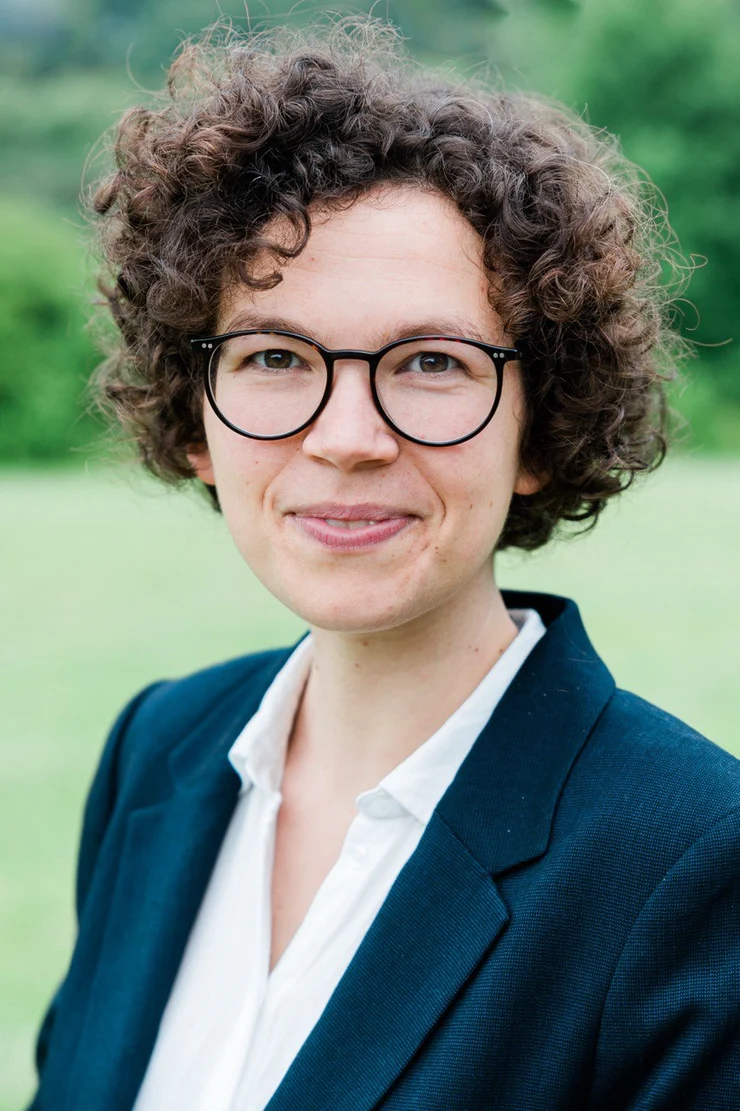
Johanna Hügel
Contact
johanna.huegel@uni-erfurt.de
Phone: +49(0)361 737-4469
LG 4, Room 119
Consultation hours during the lecture-free period via Webex(https://uni-erfurt.webex.com/meet/johanna.huegel) on the following dates (2pm to 3pm): 02/07, 09/07, 16/07; 20/08, 03/09 or by appointment.
Consultation hours during the seminar period: Tuesday 2pm to 3pm or by appointment.
Visitor address Postal address
University of Erfurt Historisches Seminar/Philosophische Fakultät
Nordhäuser Str. 63 Universität Erfurt
99089 Erfurt P.O. Box 900221
LG 4, Room 119 99089 Erfurt
Vita
- Since 2023 Academic Coordinator of the Research Group Praxeologies of Truth
- 2023 Visiting fellow, two-monthly research stay at the Institute of Contemporary History Ljubljana (Inštitut za Novejšo Zgodovino, Ljubljana)
- 2022 Research fellow, six-monthly stay at the Leibniz Instite for European History Mainz (IEG)
- 2018-2022 Research assistant at the research training group “cultural transfer and ‘cultural identity’, German-Russian contacts in European context”, University of Freiburg (until March 2023 in cooperation with the Russian State University for the Humanities, RGGU Moscow)
- 2018 Three-monthly stay at the Ilia University of Tbilissi, Georgia
- 2014-2017 Fellow of Friedrich-Ebert-Foundation
- 2016-2017 Fellow at the Forum Scientiarum der Universität Tübingen [today: Center for Interdisciplinary and Intercultural Studies]
- 2011-2017 Degree course in history and german literature (teaching degree), university of Tübingen and Moscow State University, Russian Federation
Research Projects
Russia's Policies of Truth and its Self-Staging as an Anti-Colonial Protecting Power (Post-Doc project)
Against the backdrop of the Russian war of aggression against Ukraine, there has been an increased focus on the colonial dimensions of the policies of the Russian Empire, the Soviet Union and the Russian Federation in historical and political research as well as in the media. However, the fact that the term "colonialism" has also begun to play an increasingly large role in the rhetoric of the Putin regime has so far gone largely unnoticed. It is not only in relation to states and societies in the Global South that its state representatives are portraying Russia as an anti-colonial protecting power. This narrative is also launched in relation to Russian society and the European New Right, within which Russia is portrayed as the guarantor of the morally righteous and historically true. A policy of so-called "traditional values", which is characterized by ultra-conservative gender policy, queerphobia and anti-feminism, is promoted under the umbrella of the 'anti-colonial' as a defence of supposedly traditional ways of life. Similarly, Russian politics of memory serve to turn the past into an ever-present prism through which the present can be read and interpreted. At high-profile media events such as the Russia-Africa Summit, the Soviet Union's support of anti-colonial liberation movements has increasingly become part of these historical memory and updating practices, through which the claim of being on the "right side of history" is made.
The aim of the project is to analyze these deeper narratives and strategies that underlie the profound restructuring of reality and social belonging in the Russian Federation. Methodologically, the project draws in particular on approaches from political epistemology and praxeology. Such an analysis of the epistemological level of current Russian politics is not only indispensable for understanding the processes within the Russian Federation, but also for deciphering the appropriation of postcolonial theory by the global New Right. It can also provide approaches for analyzing why parts of the global left and the decolonial school do not clearly distance themselves from Putin's regime. The appeal of this rhetoric points to the legacy of Europe’s colonial past, particularly on the African continent, demonstrating the necessity of a critical reappraisal.
„Art, Ethnography and the Secret Life of Things, Petersburg 1890-1920“ (PhD-project, defended)
The project examined a corpus of ethnographic objects compiled by the Latvian-Russian artist and art theorist Voldemārs Matvejs / Vladimir Markov (1877-1914) in the early 1910s, photographed and published in the first Russian-language writings on African and Oceanic art in Petersburg. Following Latour's dictum "Follow the Actors", the paths of selected objects were reconstructed from their contexts of origin via imperial museum collections and into the sphere of art. In particular, the project investigated the situative and changing meanings of the objects, especially their ontological status and their relationship to temporality.
Research Interests
- History of knowledge
- History of science
- Actor-network-theory
- Writing history with things
- Global interdependencies and coloniality of knowledge
- History and theory of historical times
- History of ethnographic objects – collections – theories in the 19th and early 20th centuries
- Imperial and colonial entanglements of the Russian empire and the Soviet Union
- Political epistemology
- Politics of Truth
- history and appropriation of postcolonial theories
- history of the New Right
Publications
- Conference report, Hügel, Johanna: Antirassistisches Kuratieren, wie geht das?, 07.07.-08.07.2022 Bremen, in: H-Soz-Kult, 22.08.2022 (abrufbar unter: www.hsozkult.de/conferencereport/id/fdkn-129196).
- Hügel, Johanna: Vladimir Markov, die Faktura und die künstlerische Auseinandersetzung mit der Ethnographie, Petersburg 1914, in: Bakshi, Natalia et al (Hg.): Im Labyrinth der Kulturen. Denkstrukturen, Transferprozesse, Verstehenshorizonte, Paderborn 2022, S. 295-310.
- Hügel, Johanna: Markov liest Frobenius. Eine Begegnung zwischen Ethnographie und Kunst, in: Lileev, Juirj; Pörzgen, Yvonne; Zanucchi, Mario (Hg.): Europäische Avantgarden um 1900. Kontakt – Transfer – Transformation, Paderborn 2021, S. 263-278.
- Hügel, Johanna: "Kotzebue, der Kosmopolitismus und die Weimarer Klassik – eine Polemik," in: Kotzebue International, 04/05/2021, https://kotzebue.hypotheses.org/518.
- Tagungsbericht von Heisig, Johanna: Kulturelle Spuren Georgiens in Deutschland, 04.10.2018 – 05.10.2018 Tiflis, in: H-Soz-Kult, 22.11.2018, (abrufbar unter: www.hsozkult.de/conferencereport/id/tagungsberichte-7956).
- Tagungsbericht von Heisig, Johanna: European Elites and Revolutionary Change: 1789 – 1848 – 1917. The Aftermath, 02.11.2017 – 03.11.2017 London, in: H-Soz-Kult, 08.12.2017, (abrufbar unter: www.hsozkult.de/conferencereport/id/tagungsberichte-7433).
- Heisig, Johanna: Musikalische Unterhaltung bei Charles Mayer (1799–1862), in: Ananieva, Anna (Hg.): Zirkulation von Nachrichten und Waren, Stadtleben, Medien und Konsum im 19. Jahrhundert, Tübingen 2016, S. 183 – 190.
Learn more about the work of the research project "Politics of Truth. Research Project for political epistemology" / "Praxeologies of Truth"
